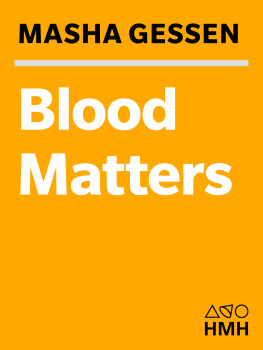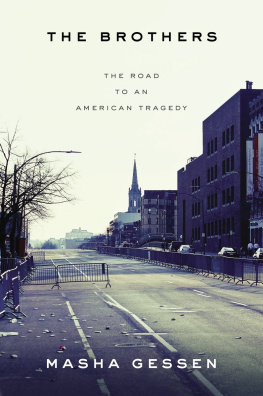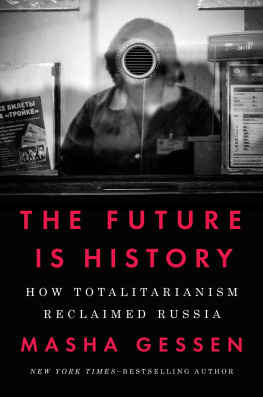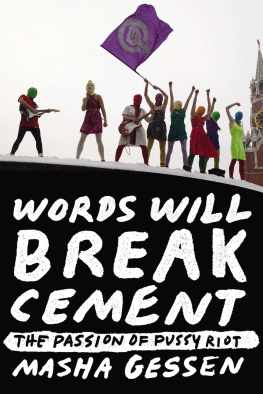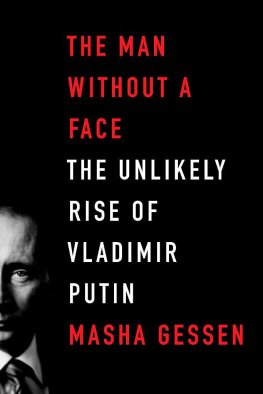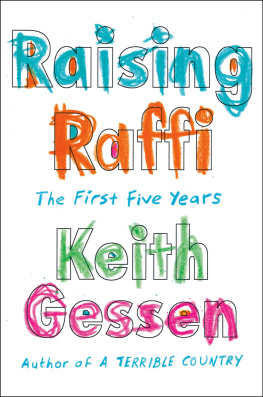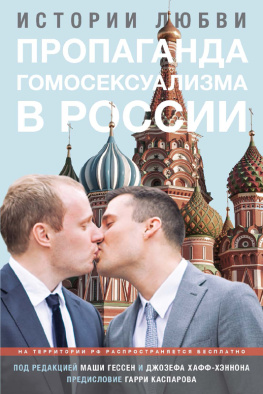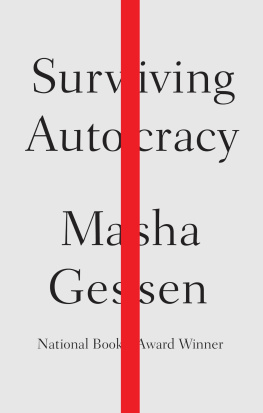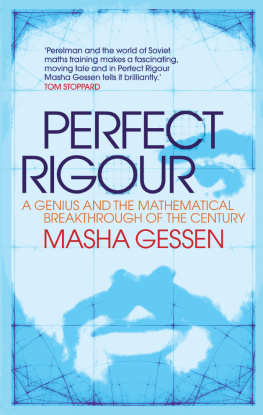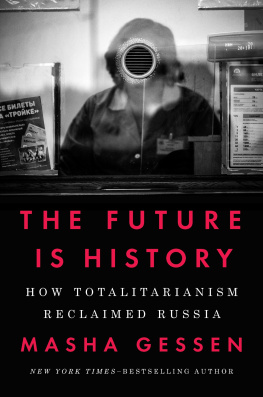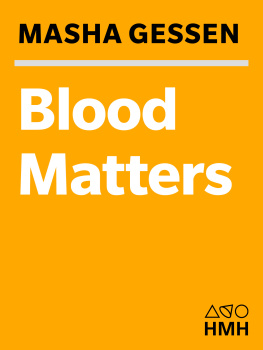First Mariner Books edition 2009
Copyright 2008 by Masha Gessen
All rights reserved
For information about permission to reproduce selections from this book, write to or to Permissions, Houghton Mifflin Harcourt Publishing Company, 3 Park Avenue, 19th Floor, New York, New York 10016.
www.hmhco.com
Portions of this book have been published in slightly different form in the following: Mutations in Granta, 2004; A Medical Quest in Slate, 2004.
The Library of Congress has cataloged the print edition as follows:
Gessen, Masha.
Blood matters: from inherited illness to designer babies, how the world and I found ourselves in the future of the gene/Masha Gessen.1st ed.
p. cm.
Includes bibliographical references and index.
1. Medical geneticsSocial aspects. 2. Human chromosome abnormalitiesDiagnosisSocial aspects. 3. BRCA genes. 4. Genetic counseling. I. Title.
RB155.G475 2008
616'.042dc22 2007036751
ISBN 978-0-15-101362-3
ISBN 978-0-15-603331-2 (pbk.)
e ISBN 978-0-547-42754-6
v3.1215
PART 1
The Past
Chapter 1
My Mothers Fatal Flaw
I SPENT THE DAY of August 21, 1992, driving to a mountainous desert town whose name, in the scorching heat and fine dust, was a seductive mockery: Palm Springs, California. I had embarked upon the most Californian of endeavors, an editorial retreat for the Los Angelesbased magazine where I worked. I ate dinner with my colleagues at a bland Mexican restaurant. I had two margaritas, talked more than I usually did, and told a story that left me vaguely uneasy, as I always feel when I talk about my mother: I cannot talk about her without telling lies. I do not remember what I said, but it was something complimentary, even prideful, I think, and though I loved my mother and was proud of her, talking of her in that way, with all that had gone wrong between us, was most certainly a lie.
I woke up at four that morning, in the bedroom of a rental bungalow, with a wave of nausea pushing its way up to my burning throat. I stumbled to the bathroom, drank from the tap and threw cold water on myself, washing my face and head clumsily, then looked at my bloated face in the mirror and wondered how two margaritas could have done this to me. I went back to bed and next opened my eyes at a few minutes before seven, without a trace of a hangover but with a sudden wakefulness I could not fight. With hours to kill before the meetings began, I tried going out for a walk in the desolation of Palm Springs, considered a swim in the kidney-shaped pool, and finally went back inside the bungalow intending to read some magazine submissions. I spread them out on the coffee table and, before starting, picked up the phone and dialed my parents in Boston. I was checking in at least daily back then and knew they would be awakethey were three hours ahead. These considerations were background noise; I had picked up the phone without pausing to think, just getting one of my daily chores out of the way while I had time to kill.
A strange male voice answered the phone.
Papa? I asked, knowing that it was not.
Hold a minute, the man said nervously, and a moment later my father came on the line.
My mother was dead. The man answering the phone was a policeman who had come to fill out a report, which, as it turned out, was a necessary part of letting someone die at home.
My mother had been diagnosed with breast cancer two years earlier. By the following summer, it had already spread to her bones, and then it got to her liver and killed her.
My mother had last woken up at seven that morningfour oclock in California, when I had first awakenedand asked for ice cream. Her liver was failing. Her throat must have been burning up. She died a few minutes before ten. That was the moment I had bolted awake for the second time, the bizarre toxic symptoms of three hours earlier mysteriously gone, and my inextricable physical relationship to my mother proven to me for the first time in my conscious lifeat the moment hers ended.
The second time the physical relationship proved itself was on January 28, 2004, at a coffee bar in Cambridge, Massachusettsan accidental location I shall avoid in the future, much as I have avoided revisiting Palm Springs. I was sitting at a small square table, trying to fix my ailing laptop, when my cell phone rang and a professionally sensitive womans voice said, I am returning your call. The results of your tests have arrived. And there is a change. She paused. In the BRCA1 gene, there is deleterious mutation. She paused. Im sorry.
BRCA stands for breast cancer. BRCA1 and BRCA2 are two genes known to play a role in the development of breast and ovarian cancer. The caller was a genetic counselor informing me that my mother had passed on to me a mutant gene. I was surprised. I was shocked. I should not have been. I had gone to get tested, I had known enough to know that I was a likely candidate for the mutation, but I was convinced that I was negative. Even if my mother had been a carrierI could not know, because she died before the gene was discoveredI had only a 50 percent chance of having inherited it. That night in Palm Springs had taught me nothing: I was certain I was immune to my mothers physical legacy.
Something had gone wrong between me and my mother, something so profound and so old that I find it difficult to describe. There was no tragic fight, no horrible misunderstanding. For as long as I can remember, we simply felt like strangers, not particularly intimate ones except by virtue of circumstance: We happened to live together. Nothing between us was ever unconditional, not even our physical proximity. I left home at fifteen.
My mother died before we had had much chance to claim our tiny islands of common ground: before I wrote anything shealso a writer and a translatorwould have enjoyed reading, before I translated my first book, using what I had learned from watching her work, and before I too became a mother. When I started writing professionally, she said proudly, My genes have won out. I remember being surprised, and silently dissenting: I did not doubt my mothers gifts, but I never believed they were also mine. I counted on moreand less. My mother was a more talented writer, a more diligent reader, and a more enterprising student. She was also handicapped by a desperate fear of people, and that fear could turn routine communication into a feat of heroism. She died at forty-nine, still gifted but not accomplished: Even if by external measure she could be considered successful, she felt anonymous and overlooked. I think that long-ago conversation with my colleagues in Palm Springs had in fact concerned my mothers career achievements, and this was why it had left me so uneasy. I knew the fear too, but of necessity I learned to get out and make my way among people early, and I had always thought that this was why I had done well with barely half of her gifts. I had assumed I was simply better at living than she had been. And even though, like all daughters of mothers who die young, I had a difficult time visualizing myself past a certain age, I had always, without really thinking about it, assumed that I would make better of what I had, and for longer, because I am not as afraid. I thought my gifts were my own, making me free from her legacy altogether. Then I found out that I got everything from her, including the flaw that killed her.
I learned the basics of the story of my flaw. I carry a genetic mutation that kills women earlyearlier and earlier with each generationthrough breast and ovarian cancer. My gene was identified about two years after my mother died and ten years before I tested positive for the mutation. It seems to be a gene that works as a tumor suppressorunless it is damaged, as it was in my mothers case and is in mine. The hereditary roulette works as follows. For most people, the genome consists of one pair of sex chromosomes (XX in women and XY in men) and twenty-two pairs of chromosomes called autosomal, plus mitochondrial DNA, which is something of a separate story. The autosomal chromosomes contain two copies of every gene, one inherited from the mother and one from the father. The BRCA1 gene resides on chromosome 17. Those born with a mutation have one normal copy and one damaged one. A child born to a parent who has a mutation has a 50 percent chance of inheriting it. If a female child inherits a BRCA1 mutation, her lifetime risk of breast cancer may be as high as 85 percent, and the risk of ovarian cancer may go up to more than 50 percent. For some reason, probably having to do with the environment or diet or lifestyle, these days women with the mutation are getting the cancers at an earlier age than their mothers and grandmothers generations.
Next page
